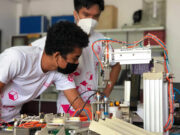Collective action to combat food waste
By Karlo Nograles
THE LATEST Social Weather Stations survey conducted in November 2020 revealed a national hunger rate of 16%, equivalent to around 4 million families — an improvement from the 7.6 million families reported in the September 2020 survey. While this result shows that loosening quarantine restrictions and reopening the economy may have ameliorated hunger, it underscores the challenge we still face.
How Catholicism lost political clout in the Philippines
By Daniel Moss
FOUR DECADES AGO, the Catholic Church inspired the movement that helped overthrow Ferdinand Marcos, Sr. Now, as the autocrat’s son begins his own presidential term, the Church’s sway over politics doesn’t come close.
TESDA: The stepchild of Philippine education
By Victor S. Limlingan
The Technical Education and Skills Development Authority (TESDA) was established through the enactment of Republic Act No. 7796 — otherwise known as the “Technical...
How COVID-19 is killing good manners and what to do about it
By Stephen L. Carter
ONE CASUALTY of the current pandemic is likely to be good manners. True, manners and civility have been dying for ages, but COVID-19 (coronavirus disease 2019) is sure to finish them off. Which is too bad.
No longer in the news
By A. R. Samson
It’s not quite true that publicity is good, even when it’s bad. Being in the headlines, except when winning a beauty contest or a...
You shouldn’t really be banking on WhatsApp
By Paul J. Davies
SMART PHONES have made life so much more convenient for everyone — well, apart from compliance sheriffs and record keepers at global banks.
Why the 1987 Constitution has endured for 32 years without amendment
And yet another plausible, even fundamental, reason why the Philippine charter has remained unamended for 32 years lies in the nation’s tradition of judicial review, specifically the power of the judiciary, i.e. the Supreme Court, to interpret the Constitution.
Myth: a religious sect’s endorsement assures election
By Oscar P. Lagman, Jr.
On April 30, I wrote in this space that a religious sect endorses only the candidates who the polls show to be likely winners. By so doing, it sustains the myth that its endorsement assures victory.
The big barriers to global vaccination
By Ilan Noy and Ami Neuberger
We will not be able to put the COVID-19 pandemic behind us until the world’s population is mostly immune through vaccination or previous exposure to the disease.
Do you have an appointment?
By Tony Samson
A DECLARED “open door” policy (my door is open… you can drop in on me anytime) in practice only applies to those higher up...
At a Crossroads: Progress or more of the same?
IN A SERIES of articles and presentations, members of the Economic team have expressed their (the government’s) views regarding how fast the Philippine economy can grow and the prospects going until 2050.
Aspiring for high-income status
By Bernardo M. Villegas
Despite the continuing weaknesses of our still fragile democracy, the Philippines is no longer known in international circles as the “sick man of Asia.”









